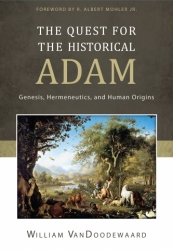We have already noted the release of William VanDoodewaard’s The Quest for the Historical Adam, an excellent historical survey of the church’s understanding of Adam and of the debate as it has taken shape today. It’s one of those works all sides will want to read, and we’re pretty sure it will be a long while before it is replaced. Today Dr. VanDoodewaard is here to talk to us about his outstanding work.
Books At a Glance (Fred Zaspel):
First, tell us what your book is all about and what our readers can expect to find. What is the contribution you have set out to make?
VanDoodewaard:
 Thank you for the kind invitation to be interviewed here at Books at a Glance. The Quest for the Historical Adam is a history of Christian understanding of human origins. The content moves from a summary assessment of Scripture on human origins, to an examination of how the church from the patristic era to the present day has engaged with the Genesis text on human origins. It concludes with an assessment of the theological implications of current views on human origins, ranging from Adam as myth, to a historical Adam who is the product of evolutionary processes, to an Adam who is specially created on the sixth day, as understood in the literal tradition. As I began to engage personally with the topic, I realized that the contemporary debate was largely severed from a historical awareness of a conversation on origins that has been happening for millennia. My desire was to help set the debate in the context of history, and to provide some initial reflection on its theological significance.
Thank you for the kind invitation to be interviewed here at Books at a Glance. The Quest for the Historical Adam is a history of Christian understanding of human origins. The content moves from a summary assessment of Scripture on human origins, to an examination of how the church from the patristic era to the present day has engaged with the Genesis text on human origins. It concludes with an assessment of the theological implications of current views on human origins, ranging from Adam as myth, to a historical Adam who is the product of evolutionary processes, to an Adam who is specially created on the sixth day, as understood in the literal tradition. As I began to engage personally with the topic, I realized that the contemporary debate was largely severed from a historical awareness of a conversation on origins that has been happening for millennia. My desire was to help set the debate in the context of history, and to provide some initial reflection on its theological significance.
Books At a Glance:
Tell us briefly why this question is important. Can you summarize for us how the historicity of Adam bears on the Bible story and on the gospel?
VanDoodewaard:
Adam (and Eve) is essential to our identity, meaning and purpose — and our self-awareness as humans created by God in his image. Adam, in his creation, calling, and life, is also essential to our identity as fallen sinners. When we come to Genesis 3:15, we begin to see that somehow God is going to work through Adam and Eve for salvation: a reality unfolded through redemptive history. But the issue is not merely about our identity or our understanding of Adam. As the first man created by God, then fallen, and receiving the promise of redemption, Adam is intimately connected to who God is our Creator and Redeemer. Adam is inseparably connected to the person and work of Christ. When we move to a mythical Adam, or a historical Adam of evolutionary origins there are significant, negative theological consequences for the gospel.
Books At a Glance:
Your book traces out the church’s understanding of Adam at considerable length throughout the centuries. In just broad strokes, what do we learn from historical survey? What general observations can you make?
VanDoodewaard:
While there has been some hermeneutical variety of approach to Genesis 1 and 2 between the patristic era and the late 18th and early 19th centuries, almost all Christian theologians held to a special, temporally immediate creation of Adam and Eve in coherence with the literal tradition. There is a substantial shift into the 20th century. What is fascinating to me is that the patristic and medieval fathers who adopted an allegorical approach did so because of the pressure of Greek natural philosophy. Yet only a few thinkers in nearly two millennia carried this forward into Genesis far enough to revise their understanding of human origins. When we move to the post-Reformation period, we see the development of pre-Enlightenment thought beginning to challenge Adam as the first man, on the basis of both Greek natural philosophy and non-Christian religious narratives. This occurs long prior to Darwin — and is born outside the realm of Christian orthodoxy. When it comes into the life of the church it has a substantial impact.
Books At a Glance:
Can you identify what has brought about the increasing rejection of the historical Adam? Is it fair to say that apart from Darwin and evolutionism this question would not be in debate today? Have there been any other driving considerations – historically or in contemporary discussion?
VanDoodewaard:
Darwin (along with a number of his contemporaries) stands as an heir of an earlier philosophical-religious movement, not the founder. He is not the origin of the challenge to the historical Adam. However, it is especially through Darwin’s watershed synthesis of ideas and popularization of them that they begin to enter the realm of Protestant Christianity. The 19th and 20th century history of the church indicates over and over again that the consequences are erosive to the historical Adam. I think two key factors since the nineteenth century are: (1) the resurgence of an older natural philosophy (with roots in a comparative religious approach) restated in conjunction with the development of modern science, and gaining a popular credibility, along with (2) the growth of acceptance of successive alternate hermeneutical approaches to Genesis within the Christian church.
Books At a Glance:
We have many solid evangelical and Reformed interpreters on all sides of the question of the age of the earth and of the interpretation of the “days” of Genesis. It’s pretty clear that holding to an old earth position does not necessitate a denial of the historical Adam and Eve. So, in your opinion, how are these questions (of the age of the earth and the interpretation of the creation “days”) related to the question of the historicity of Adam or otherwise important in this discussion?
VanDoodewaard:
I am thankful for evangelical and Reformed interpreters who, while holding to alternate interpretations of Genesis 1, affirm the necessity of the historical Adam and Eve. Being in error to a degree does not necessitate that we as individuals will move along in that error to its full extent. However, what I think becomes clear in the study of church history is that the succeeding generation will often pursue a greater consistency of thought — for good or ill. So if we adopt a hermeneutical approach that does not have sound exegetical warrant, and in the case of early Genesis, if our approach allows for reinterpretation without exegetical warrant for a discrete endpoint, there is every reason exegetically and hermeneutically for the next generation to continue in that vein. We may hope that “theology” will hold things back, but if theology finds its authority in the exegesis of the text, then we have at least set ourselves up for an internal conflict and loss of the unity of Scripture. At worst, we have put in motion a whole-sale reinterpretation of Scripture leading to the loss of Christian orthodoxy.
Books At a Glance:
It has long been observed that we have two volumes of divine revelation – general and special – and that God speaks infallibly in both. And so we should be willing to learn from both. And yet errors in interpretation occur with both – we have misunderstood both Scripture and the “science” of general revelation. So what is the best way to proceed when science and Scripture seem to conflict?
VanDoodewaard:
Very carefully. We must remember that where we see conflict, the problem is with us, not with special or general revelation which are in perfect harmony. Praying that the Holy Spirit would guide us in understanding the Word of God, and the world he has made is essential. We must always give a weight of priority to Scripture as the necessary interpreter of ourselves and all that exists. This does not mean that our understanding of Scripture may never be adjusted, but it does mean that we need to be willing to humbly submit to the text as the Word of God — and be willing to accept that this will mean that we, with the Word, will be viewed by some as “foolish” and “stumbling blocks” (1 Corinthians 1:23). We need to consider not only the specific texts that directly relate to the issue at hand, but consider these texts in the context of the whole of special revelation. As we pursue understanding in cases of perceived conflict we should do this not merely as individuals, but also corporately, within the communion of the saints, within the life and authority of Christ’s church (past and present), respecting the ruling bodies of elders and ministers, all of which are also to be corporately submitted to the Word.
As we secondarily turn to “science” we need to realize that it is a fallen human philosophical and interpretive endeavor; it is not merely “fact”, but also theory. General revelation is infallible, “science” is not. To best engage on the scientific side requires understanding of Scripture and theology, the history of natural philosophy, and technical aspects of scientific research and interpretive method. That is not to negate that many of the descriptions and interpretations of natural reality by scientists may and do cohere accurately with reality. As we engage with scientific interpretations of natural reality at apparent points of conflict, we must do so honestly and wisely, with a genuine willingness to engage alternative scientific hermeneutics, especially where these may enable a better coherence with special revelation. But even these alternatives may not satisfy. As we engage with points of conflict, we must do so understanding that human “science” may never fully comprehend aspects of natural reality. As we pursue resolution of apparent conflicts realizing our fallibility, limitations and weakness, we can do so with confident anticipation and joy. This is God’s world, his truth will prevail. He has graciously given us the resources we need to grow in knowing all that we need to know — including the call to the humble awareness that we can’t know it all (Job 38:4).

